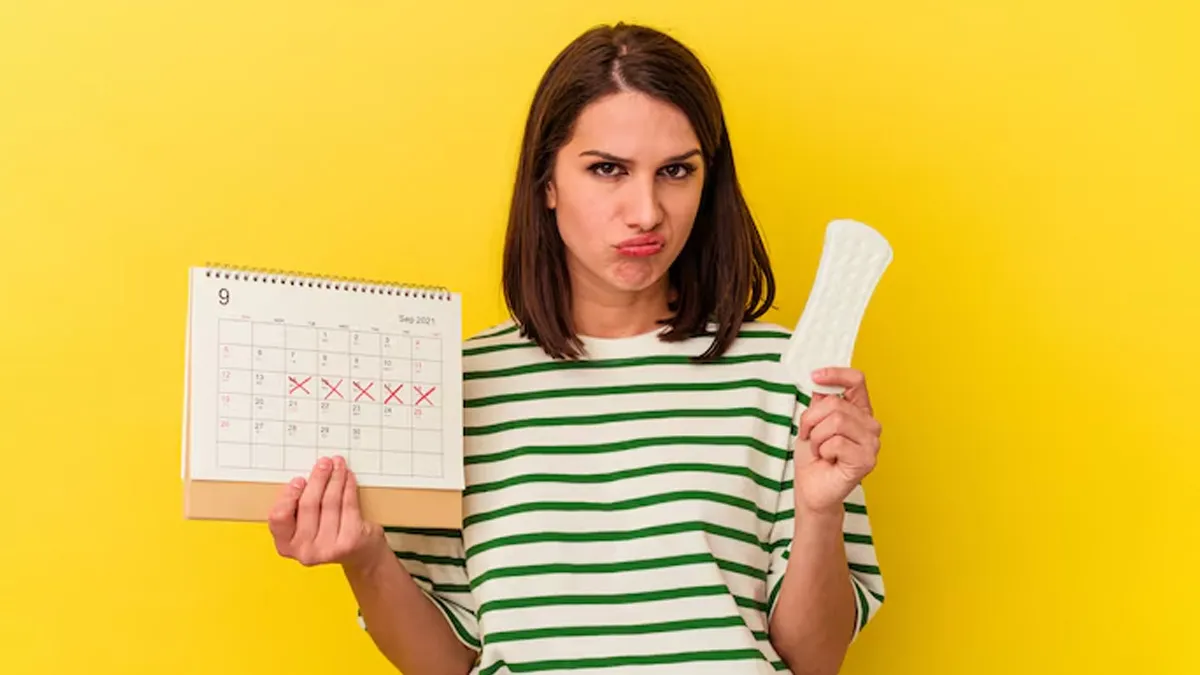
You must have noticed that many menstruating teens have longer period durations, lasting 5-7 days in some cases. As women age, this span often decreases to 3-4 days. This is because of a change in their overall hormonal cycle. But does age really impact a woman’s cycle length? How to know if your menstrual cycle span is healthy or not? If you want answers to all these questions, read this article.
Table of Content:-
The editorial team of OnlyMyHealth reached out to Dr Sukirti Jain, Consultant Obstetrics and Gynaecology, Cloudnine Group Of Hospitals, Navi Mumbai, to get an expert view on this topic.
Can Menstrual Cycle Span Decrease With Age?
Dr Jain says that a woman’s menstrual cycle is a reflection of her reproductive health and hormonal balance. “It’s normal for your cycle to change slightly as you age, but when it becomes noticeably shorter, many women start to worry,” she adds. So, does age really affect how long your cycle lasts — and when should you be concerned? Let’s find out.
Now let us straightaway get to the main point – do a woman’s period span really decrease as they age? “Yes, in many cases, menstrual cycles can shorten with age. During the teens and early 20s, cycles are often slightly irregular and may last anywhere from 26–35 days. As women reach their 30s and 40s, hormonal fluctuations — particularly a decline in progesterone levels — can lead to shorter cycles, sometimes as brief as 21–25 days,” answers Dr Jain.
She adds, “In the years approaching menopause (perimenopause), the ovaries release fewer eggs, and estrogen and progesterone production become inconsistent, causing both shorter and irregular cycles.”
Healthy Menstrual Cycle In Different Age Groups
On this note, the expert shares what a healthy period cycle span looks like, for women in different age groups:
Teens: Cycles can range from 25–45 days as hormones stabilise. Flow may be heavier or lighter, and irregularity is common.
20s: Cycles generally settle into a regular rhythm (28–35 days). Periods are predictable, lasting 3–7 days.
30s: Cycles may become shorter due to subtle hormonal shifts. Some women notice lighter bleeding or a shorter duration.
40s and above: Perimenopausal changes begin — cycles may shorten, lengthen, or skip altogether before menopause sets in.
Also Read: Bloated During Periods? Expert Shares What It Means
Shorter Period Duration – A Cause Of Concern?
Dr Jain shares that a slight decrease in period length (by a day or two) is usually not a concern, especially as you approach your 30s or 40s. “However, if your cycle becomes consistently shorter than 21 days, or if bleeding is unusually light or heavy, it could indicate an underlying issue like thyroid imbalance, stress, low body weight, or premature ovarian ageing. Consulting a gynecologist helps rule out these causes and ensures timely treatment,” she explains.
“A healthy menstrual cycle typically lasts between 24–35 days, with bleeding for 3–7 days. The key is consistency — if your cycle stays roughly the same month to month, that’s a good sign your hormones are in balance,” shares Dr Jain.
But how do we know if our cycle span is too short? “A cycle shorter than 21 days is considered abnormally short and may suggest hormonal imbalances or issues with ovulation. In such cases, the uterine lining may not develop fully, which can impact fertility,” explains Dr Jain.
What Causes Menstrual Cycle Irregularities?
Several factors can throw off your menstrual rhythm, shares Dr Jain, including:
- Stress and anxiety.
- Thyroid disorders.
- Polycystic Ovary Syndrome (PCOS).
- Extreme weight loss or gain.
- Excessive exercise.
- Perimenopause.
- Certain medications or hormonal birth control.
- Identifying the cause early helps in restoring regularity and maintaining hormonal balance.
Light menstrual flow can sometimes occur without an apparent cause, but women should see a doctor when they are experiencing the following conditions:
- Delay in period for 3 consecutive months.
- Suspecting pregnancy.
- Irregular menstrual cycles.
- Bleeding between periods.
- Painful periods.
Also Read: What Is Period Flu? Expert Explains Its Causes, Symptoms And More
How to Prevent Irregularities
On this note, Dr Jain shares tips to prevent irregular periods:
- Maintain a balanced diet: Include iron, calcium, and omega-3-rich foods.
- Exercise moderately: Yoga, brisk walking, or cycling support hormonal health.
- Sleep well: 7–8 hours of rest helps regulate hormone secretion.
- Manage stress: Deep breathing, meditation, or journaling can help.
- Track your cycles: Use a menstrual tracking app to monitor any consistent changes.
The Final Word
Menstrual cycles can naturally shorten with age — especially as women move into their late 30s and 40s. But as long as your cycle stays consistent and you feel healthy, there’s usually no cause for concern. If your periods become very short, irregular, or are accompanied by other symptoms like fatigue or severe cramps, consult your gynecologist. Remember, your cycle is your body’s way of communicating with you — learning to listen is the first step toward lasting reproductive wellness.
Also watch this video
FAQ
How long is a normal menstrual cycle?
A normal period cycle is typically 21 to 35 days.Is a 40 day cycle still normal?
While the average menstrual cycle lasts 28 days, a normal cycle can range from 21 to 45 days.What is the time span of a period?
The period of menstruation refers to the entire menstrual cycle, which is counted from the first day of one period to the first day of the next.
How we keep this article up to date:
We work with experts and keep a close eye on the latest in health and wellness. Whenever there is a new research or helpful information, we update our articles with accurate and useful advice.
Current Version
Nov 15, 2025 18:35 IST
Published By : Shruti Das
